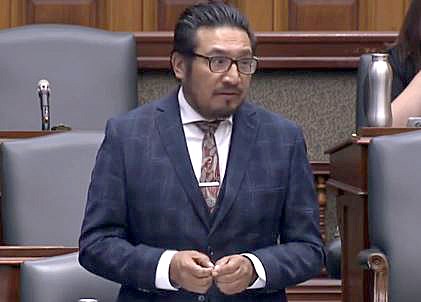Northern NDP MPPs are speaking out against amendments to Ontario legislation that eliminates environmental consultation regarding the use of Crown and treaty lands.
Members of the NDP Northern Caucus, including Sudbury MPP Jamie West and Nickel Belt MPP France Gélinas, sent a letter to Premier Doug Ford this week expressing concerns that Bill 197 tramples on First Nations rights.
Bill 197, now the COVID-19 Economic Recovery Act, 2020, was passed July 21 after three days of discussion. It is designed, among other things, to speed up business development red tape to stimulate the economy in response to the pandemic.
“Economic recovery should not happen at the expense of treaty rights,” says Sol Mamakwa, NDP Indigenous Relations and Reconciliation critic.
First Nations leaders across Ontario have contacted Mamakwa with concerns about Bill 197 (section 6).
The legislation eliminates the need for a 30-day environmental consultation by the public on development of Crown or treaty lands, says Mamakwa.
In a letter sent to the premier earlier this week, the NDP MPPs wrote, “First Nations from across our region have reached out to our offices to share how these changes will have grave effect on the ability of communities to influence forest management planning, project assessments and the environmental assessment process on their traditional territories and treaty lands.”
“First Nations should have been consulted on Bill 197 because it impacts them,” said Mamakwa.
Calling the act “illegal,” Mamakwa wants to see it appealed or amended regarding changes to the Environmental Assessment Act.
“First Nations are not against development (But) We need to be at the table…to be engaged. We need to have a say on what happens on the traditional territory of the First Nations.”
The legislation does state "Nothing in this Act shall be construed so as to abrogate or derogate from the protection provided for the existing Aborignal and treaty rights of the aboriginal peoples of Canada as recognized and affirmed in section 35 of the Constitution Act, 1982."
Mamakwa says the keyword is “construed,” which means something is left to interpretation. He is also worried this emergency legislation might remain in place longer than required.
“The Supreme Court has made it very clear over the last few decades that the Crown must conduct itself in a manner that respects and honours the Treaty relationship.”
The COVID-19 Recovery Act amends 20 pieces of legislation that govern the province’s schools, municipalities, and justice system.
“The government has given itself a lot of authority…People need to be part of the dialogue,” says Mamakwa.
On its website, Environment Defence, an advocacy group, charges the changed to environmental laws will “bar experts from assessing the environmental impacts of many public infrastructure projects, and keep communities in the dark about what’s happening in their own backyards.”
Sudbury.com has closed comments on this story.
